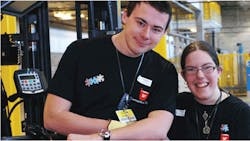There's more to corporate social responsibility (CSR) than just setting goals for recycling, energy reduction and other sustainability measures. What about sustaining your brand? And what about responsibility to your workforce, your partners and your community?
When the sustainability revolution took shape in the early part of the last decade, for many distribution centers and warehouses the focus was on how to be green—without costing a lot of money. Recycling plans were implemented to properly dispose of waste, light bulbs were changed to energy efficient LEDs and facility layouts were altered to reduce travel times for battery powered forklifts. For many companies, driving environmental initiatives had a direct impact on their ROI (return on investment).
See Also: Global Supply Chain Logistics Management
Over the years sustainability has been more positively correlated with companies that adopt social sustainability as part of their "way of doing business" rather than just a single-minded focus on the environment.
However, before 2007, few companies focused on the people part of CSR—and helping them be the best they can be. That was the year Walgreens opened its distribution center in Anderson, South Carolina, with a goal to build a workforce substantially powered (40%) by people with disabilities.
The overall goal of CSR is to embrace responsibility for a company's actions and their positive impact on the community, customers, environment, employees and shareholders. In essence, CSR is a guide to what the company stands for and will uphold for its customers.
More than One Environment
While CSR was a term first coined in the 1960s and early 1970s, its popularity in the industry did not expand until the late 1990s. It was during the 1990s that the focus on environmental stewardship started taking shape in the supply chain area.
Distribution and warehousing are not industries that many first think about when considering how to solve the world's problems. But, several companies are changing that view – Walgreens, Lowe's, and Best Buy, to name a few.
While 2007 does not seem so long ago, in terms of CSR's evolution and development, it's practically the dark ages. That's why Walgreens' approach for its new DC was ground-breaking and worthy of note.
Walgreens takes a five-pronged approach to social responsibility, giving equal weight to community, environmental sustainability, diversity, supplier diversity and disability inclusion.
On the supplier diversity front, many companies such as Apple, Xerox and P&G have supplier diversity programs, but Walgreens actually issued an annual report on that specific subject in 2010. The company says supplier diversity "isn't just good business, it's good for business. When Walgreens began its supplier diversity initiative, the goal was to increase the purchase of goods and services (also known as "spend") from diverse and small businesses. This objective has grown into a winning initiative that is strengthening not only Walgreens' business, but the communities represented by diverse business owners."
Walgreens says its goal is to spend at least $1 billion annually with diverse suppliers. For example, the Community Corner program, which began in 2010 featuring African-American suppliers in 1,180 stores, generated a 12 percent increase across the total chain in sales among its 17 featured products, and an estimated 42,000 consumer baskets contained at least one of those featured products. Sales of those products increased by about 9 to 43 percent year-over-year.
Lessons Learned in Anderson
Walgreens' disability inclusion program expands the company's social responsibility vision, and includes best practices learned from its hiring program in the Anderson, S.C., DC. These practices are being replicated by others in warehousing and distribution.
The $175 million, 700,000-squarefoot facility employs about 335 workers, 47 percent of whom have a physical or cognitive disability like autism or mental retardation. The program is about giving people a chance to prove themselves. People with disabilities die a death of 1,000 cuts. The unkindest cut is the belief that people with disabilities cannot do the job.
Since 2007, Walgreens has spread the program to other DCs and warehouses in its network. Then in 2012, Walgreens moved it from the backroom of warehouses to the storefront by developing a program to hire people with disabilities to work in the more than 8,000 Walgreens stores across the United States.
Companies such as Lowe's, Best Buy and others have journeyed to Walgreens' Anderson DC to learn how to implement and lead a disability inclusion program in their warehouses. Lowe's has been one of Walgreens greatest partners in developing and leading the change that is now occurring in distribution and warehousing—with a true focus on improving the lives of their employees and community.
Passing the Torch
However, with the ever-changing landscape of leadership in companies who are passionately driving social initiatives, and considering that CSR is still going through growing pains, who will take up the social responsibility banner with the same drive and passion? Who will keep alive the social part of social responsibility?
It could be the younger generation of professionals in the supply chain industry as they rise through the ranks into positions of influence. Generation Y, also known as the "Millennial Generation"—basically those born from the latter 1970s or from the early 1980s to the early 2000s—apparently see business playing a major role in societal development.
The Harvard Business Review's The Daily Stat, which showcased the survey, said, "In a survey of more than 1,000 of its employees born after 1981, Deloitte Touche Tohmatsu found that when respondents were asked to name three terms that encapsulate the purpose of business, 51 percent cited societal development and only 39 percent cited profit."
For fans of CSR, those are some heartening numbers.
Randy Lewis was Walgreens' senior vice president of supply chain and logistics before retiring earlier this year.
Bill DiBenedetto writes about alternative energy, logistics and outsourcing.
Joseph Tillman is a senior researcher for Supply Chain Visions, Ltd. (www.scvisions.com).

